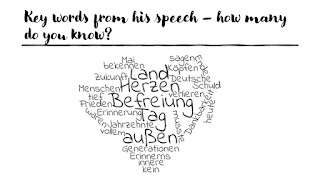Why bother, when I'm already woefully behind in my scheme of work? As a teenager trying to make sense of the world and my place in it, this is exactly the kind of material I would have wanted my teachers to share with me - texts with substantial ideas that offer a different view of an event commemorated across Europe. To me, it is important to help students begin to understand that different countries and cultures view things differently. If we don't teach them to appreciate this, then we are always going to badly misunderstand our neighbours.
Of course, it is easier said than done with a speech of this complexity and richness, and I faced the added challenge of providing the work for the students to work through independently (with me available on Google Classroom in case of problems). I still wanted it to build their language skills and practise the vocabulary and key verbs from the festivals topic.
I selected sections from the latter stages of the speech, which focused on the idea of VE Day as a day of liberation, and what liberation and freedom meant. I went through several attempts at this, and in the end took out a reference to Artikel 1 in the Grundgesetz that I would have left in if I had done it in class, as this would have needed a lot of unpacking on its own, and that is something I would like to do with them in person, and also fits in with the social issues topic we will do later and hopefully in person. Having selected a section, and worked out exactly which parts I wanted to use, I was able to think about how I made it accessible to the
First phase: building up vocabulary
1. I wanted them to think about verbs, and the difference between the different words we might use:
2. I then got them to think about key words from the speech, and word families, such as this:
3. Beginning to introduce ideas from the speech, I asked them to find opposites:
Second phase: Describing the photos
This is a standard GCSE task, but I had an ulterior motive: I wanted them to start considering the imagery that we shared when we celebrated. As these were a warm-up to the main part of the work, I allowed this to be a "choose the correct option" task. Still giving them a German workout, but keeping it low-demand.
The second photo I chose was partly to choose the different aspect of commemorating, but also so I could teach them the word "Dudelsack". This is an opportunity never to be missed.
I then moved onto a photo from Germany. Students are often curious, and will ask about how the Germans view the second world war, but they often assume that it is something to be swept under the carpet, or they see it through our lens of winning and losing. I think it is good to show them how it is actually handled.
Third Phase: The speech
2 final pieces of warm-up. I introduced the exercise in English, explaining briefly who the Bundespräsident is, and what I wanted them to get out of it. The final part of the vocabulary / idea building was a word cloud made out of the words from the extract, so the larger words were those which appeared more than once in the speech:
The exercises were in 3 stages:
1. Passages from the speech in parallel text form.
2. questions that tested their understanding of the ideas
3. "Find the German" to get them to really focus on the German, not just gloss over it.
Here is the first section and its exercises:
Once we got to the end, what did I want them to do with it? This had already been a long piece of work, and the work I've received from students has shown that by this stage they had already spent a lot of time on it. I had toyed with doing some "match the sentence halves" exercises, but in the end, I wanted their response to the ideas of the speech, not merely some functional language work. So, I gave them a choice. Their response is their work over this week, although I've already had a few submissions. Some have done a word cloud of their most important words, others have created an image based on the key words for them. I know from the messages that some have thought long and hard about the ideas, and have also found it interesting. If I have been able to heighten their awareness and make them think, then I will be happy.
The full powerpoint is uploaded on tes here
https://www.tes.com/teaching-resource/how-do-the-germans-see-ve-day-12311969














